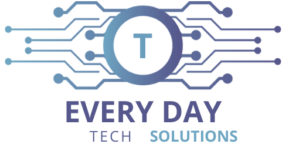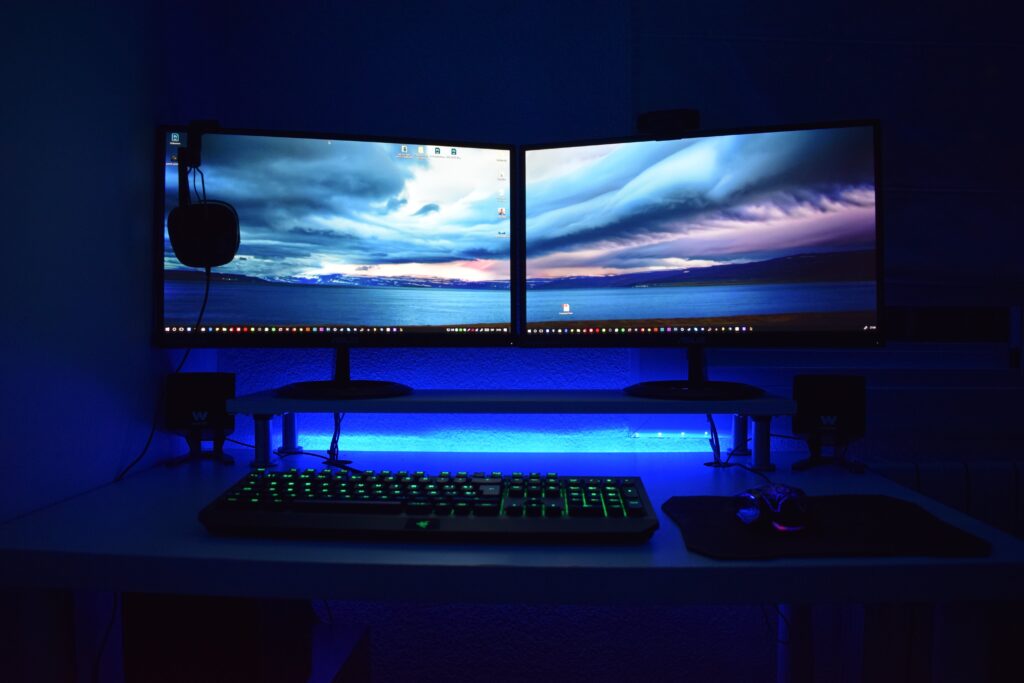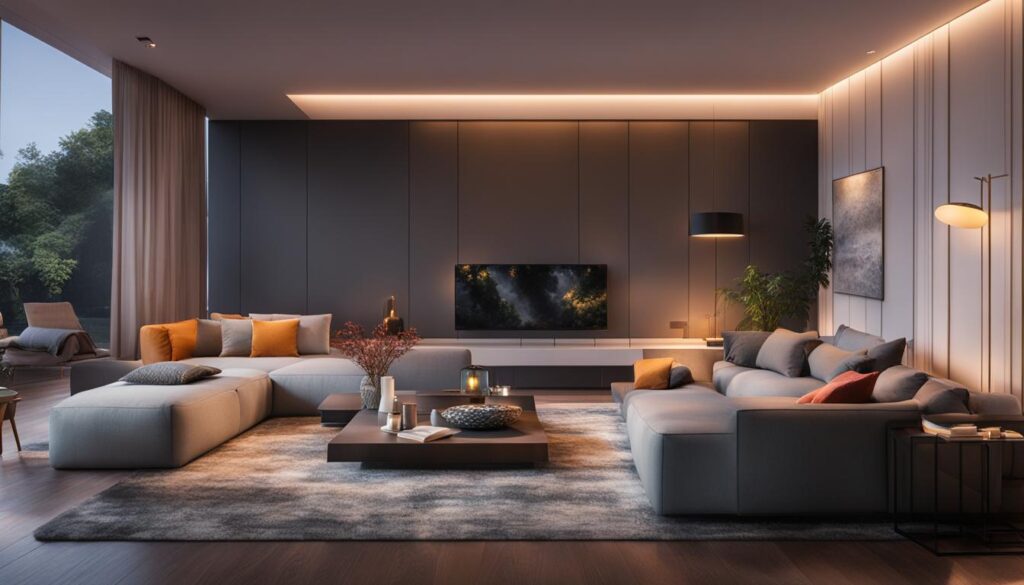Are you considering venturing into the home automation industry? If so, you may be wondering about the profit potential and financial benefits this industry has to offer. Well, you’re in the right place! In this article, I’ll explore the exciting world of home automation and shed light on why it is a promising business opportunity.
Home automation has gained significant popularity in recent years, with more and more homeowners seeking to enhance their living spaces with smart technology. From controlling lights and thermostats with a simple voice command to monitoring security cameras remotely, the possibilities are endless. As the demand for home automation solutions continues to grow, so does the opportunity to capitalize on this ever-expanding market.
One of the key advantages of starting a home automation business is the relatively low startup costs compared to other ventures. With a solid business plan and strategic investments, you can establish a profitable business without a significant financial burden. Additionally, home automation businesses enjoy high customer retention rates and offer attractive profit margins, providing a financially rewarding venture.
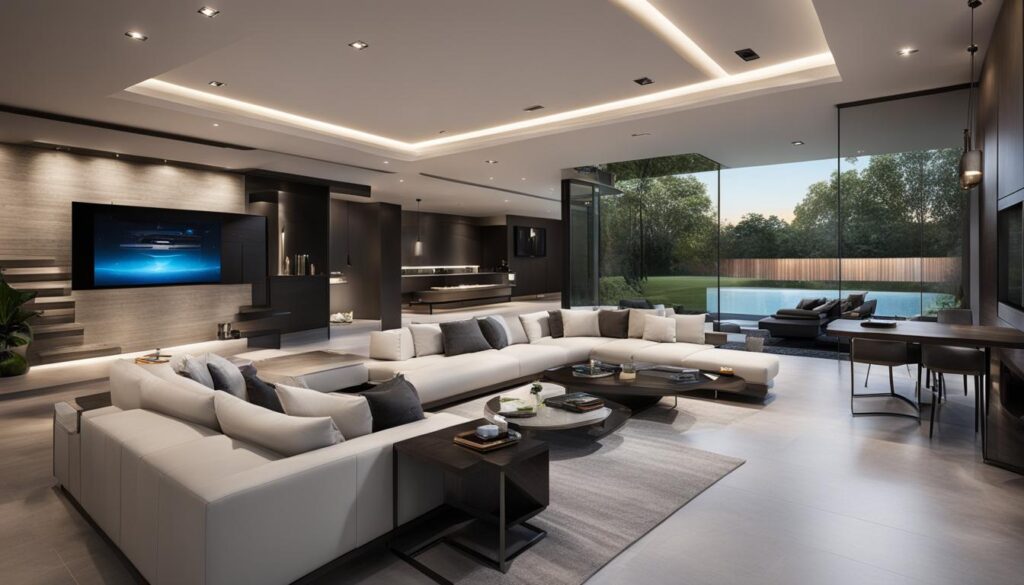
Key Takeaways:
- The home automation industry presents a lucrative business opportunity with high profit potential.
- Startup costs for a home automation business are relatively low compared to other ventures.
- Home automation businesses enjoy high customer retention rates and offer attractive profit margins.
- With a home automation business, you have the flexibility to choose your clients and control your workload.
- The home automation industry allows you to gain exposure, experience, and establish a solid foundation of clients.
The Benefits of Starting a Home Automation Business
Starting a home automation business offers numerous advantages and can be a rewarding endeavor. Whether you’re tech-savvy or passionate about helping people enhance their homes, the benefits of venturing into the home automation industry are plentiful.
Work from Home, Eliminate Storefront Costs
One of the key benefits of starting a home automation business is the ability to work from the comfort of your own home. This eliminates the need for a physical storefront, reducing overhead costs and allowing you to focus on delivering exceptional service to your customers.
Low Startup Costs, High Margins
The startup costs for a home automation business are significantly lower compared to most businesses. With minimal investment in tools and equipment, you can enter the market and begin offering your expertise. Additionally, home automation businesses typically enjoy gross margins of around 80%, providing ample room for cost management and business growth.
Satisfying and Rewarding Work
By providing solutions that enhance the functionality and convenience of homes, a home automation business offers truly rewarding work. You’ll be able to address your customers’ needs and exceed their expectations, ultimately improving their quality of life.
Flexibility and Control
With a home automation business, you have the flexibility to choose your clients and the projects you work on. This allows you to tailor your services to your strengths and interests, ensuring that every endeavor aligns with your goals and values. You’ll also have the freedom to set your own schedule and workload, providing you with the work-life balance you desire.
Constant Learning and Exposure
Working in the home automation industry exposes you to a wide range of businesses and technologies. This gives you the opportunity to gain valuable experience and expand your knowledge as you collaborate with different clients and explore emerging trends. Additionally, you can use this exposure to establish yourself as an expert in the field, further enhancing your credibility and reputation.
Physical Activity and Better Health
A home automation business involves daily physical activity, which can contribute to your overall health and well-being. From installing devices to troubleshooting and maintenance, you’ll enjoy a combination of mental stimulation and physical exertion, promoting a healthy and active lifestyle.
Be Your Own Boss, Work Anywhere
Starting a home automation business allows you to be your own boss and take control of your professional destiny. You have the freedom to make decisions and shape your business operations according to your vision and values. Additionally, with the right setup and tools, you can work from anywhere in the world, providing flexibility and the possibility of new travel experiences.
Referrals and Loyal Customer Base
In the home automation industry, referrals play a crucial role in attracting and retaining customers. Satisfied clients are more likely to recommend your services to their friends and family, helping you establish a solid foundation of loyal customers. By consistently delivering exceptional service and exceeding expectations, you’ll build a reputation that drives your business forward.
Comparing Home Automation Business Benefits
| Benefits | Description |
|---|---|
| Work from Home | Eliminates the need for a physical storefront and allows you to work from your own home. |
| Low Startup Costs | Requires minimal investment compared to other businesses. |
| High Margins | Gross margins typically reach around 80%, allowing for cost management and business growth. |
| Satisfying Work | Provides solutions to customers’ needs, improving their quality of life and enhancing their homes. |
| Flexibility and Control | Offers the flexibility to choose clients and projects, giving you control over your workload. |
| Constant Learning and Exposure | Allows you to gain experience and knowledge as you collaborate with different businesses. |
| Physical Activity | Involves daily physical activity, contributing to better overall health. |
| Be Your Own Boss | Enables you to make decisions and have control over your business operations. |
| Referrals and Loyal Customers | Attracts and retains customers through recommendations and a solid customer base. |
Starting a home automation business provides a host of benefits, from the freedom to work from home and lower startup costs to high margins and the opportunity for constant learning. With the ability to create your own schedule, choose your clients, and gain exposure in the industry, a home automation business opens doors to a fulfilling and lucrative venture.
The Cost of Home Automation
When considering home automation, one of the crucial factors to consider is the cost involved. The total cost of home automation can vary depending on the extent of installation and the brands or companies chosen. On average, homeowners can expect to spend around $5,500 to automate lights, door locks, thermostats, and install a smart speaker and hub.
Cost Breakdown by Room
| Room | Full Installation Cost |
|---|---|
| Smart Kitchen | $6,000 – $16,000 |
| Smart Living Room | $3,500 – $12,000 |
| Smart Bathroom | $2,500 – $7,000 |
To automate a smart kitchen, homeowners can expect to spend between $6,000 and $16,000. For a fully automated living room, the cost can range from $3,500 to $12,000. Smart bathrooms typically cost between $2,500 and $7,000 for full installation.
It’s important to note that these cost estimates are general guidelines and can vary depending on individual preferences, customization, and the complexity of the installation. Working with a reputable automation specialist can help provide a more accurate estimate tailored to your specific needs.
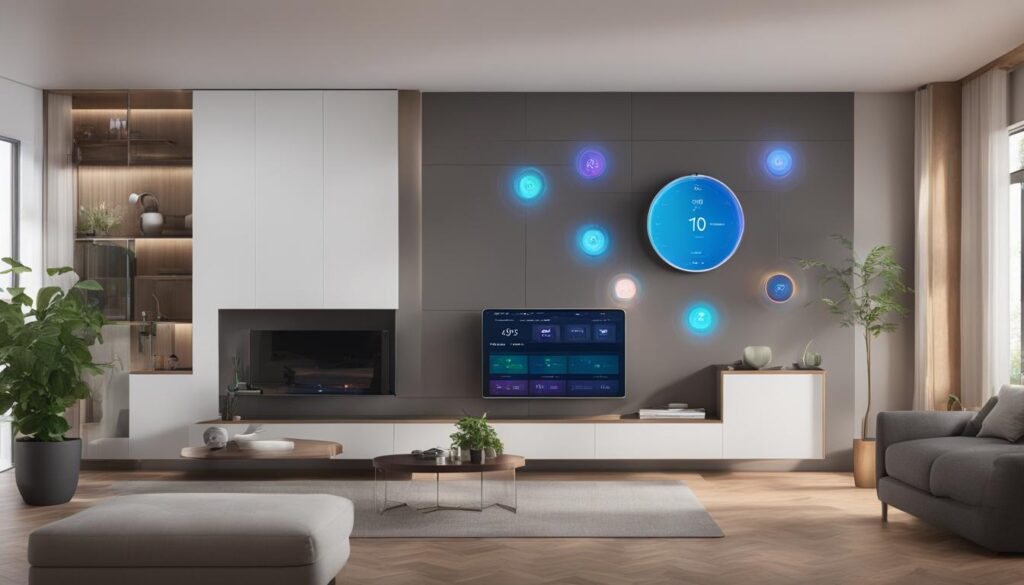
Investing in home automation can bring a range of benefits, including increased comfort, energy efficiency, and security. While the initial cost may seem significant, it’s important to consider the long-term value and potential savings that can be gained through automated systems.
Whether you’re looking to automate specific rooms or your entire home, evaluating the cost and weighing it against the potential benefits is an essential step in making an informed decision about home automation.
Popular Smart Home Automations
Smart homes are becoming increasingly popular, thanks to their ability to enhance convenience, security, and energy efficiency. Here are some of the most popular smart home automations that homeowners are incorporating into their daily lives:
1. Smart Thermostats
Smart thermostats allow for intelligent climate control, enabling homeowners to remotely adjust the temperature and save on energy costs. These devices can learn and adapt to your schedule, ensuring optimal comfort throughout the day. Prices for smart thermostats range from $70 to $800, depending on the brand and features.
2. Smart Locks
Smart locks provide keyless entry and remote access to your home, offering convenience and enhanced security. With smart locks, you can lock and unlock your doors using your smartphone or a key code. Prices for smart locks typically range from $150 to $400, depending on the brand and level of security.
3. Video Cameras and Doorbells
Video cameras and doorbells offer homeowners peace of mind by providing real-time surveillance and the ability to monitor their property remotely. These devices can range in price from $100 to $350, depending on the brand, resolution, and features.
4. Smoke Detectors
Smart smoke detectors not only alert homeowners to the presence of smoke but also provide notifications to your smartphone, ensuring that you are immediately aware of any potential fire hazards. Prices for smart smoke detectors typically range from $50 to $150 each, depending on the brand and additional features.
5. Smart Lighting
Smart lighting options include smart light bulbs, which can be controlled remotely, scheduled to turn on or off at specific times, or even change colors to create ambiance. Prices for smart light bulbs range from $5 to $49.99 per bulb, depending on the brand and functionality.
These smart home automations are just a few examples of the common functions that can enhance your home’s convenience, security, and energy efficiency. By incorporating these technologies into your home, you can enjoy a more comfortable and connected living environment.
| Smart Home Automation | Price Range |
|---|---|
| Smart Thermostats | $70 – $800 |
| Smart Locks | $150 – $400 |
| Video Cameras and Doorbells | $100 – $350 |
| Smoke Detectors | $50 – $150 |
| Smart Lighting | $5 – $49.99 per bulb |
As technology continues to advance, we can expect even more innovative smart home automations to transform the way we live. Investing in these popular smart home functions can not only enhance your daily life but also increase the value and appeal of your home.
DIY vs. Professional Installation
When it comes to home automation installations, the decision between DIY and professional installation ultimately depends on the complexity of the items and the homeowner’s time availability. While some installations, such as a Ring camera, can be easily done by a homeowner, more extensive automation projects may require the expertise of a professional.
Opting for a DIY home automation installation can be a cost-effective solution for homeowners who have the time and skills to tackle the project themselves. It allows for personalization and hands-on involvement in the setup process. DIY installations are well-suited for simple devices, such as smart plugs or basic security systems.
On the other hand, professional home automation installation offers a range of benefits that can make it worth the investment. Hiring a professional ensures that the installation is done correctly and efficiently, minimizing the risk of errors or compatibility issues. Professionals have the expertise to handle more complex systems and integrate various smart devices seamlessly.
Here are some key benefits of professional installation:
- Expertise: Professionals have the knowledge and experience to handle complex installations and troubleshoot any issues that may arise during the process.
- Time-Saving: Hiring a professional saves homeowners valuable time, as the installation will be completed efficiently and effectively.
- Peace of Mind: Professionals provide peace of mind by ensuring that the automation system is set up correctly and functions smoothly.
- Customization: Professionals can offer personalized solutions based on the homeowner’s specific needs and preferences, maximizing the functionality of the home automation system.
- Integration: Professionals can seamlessly integrate different smart devices and systems, creating a unified and cohesive smart home experience.
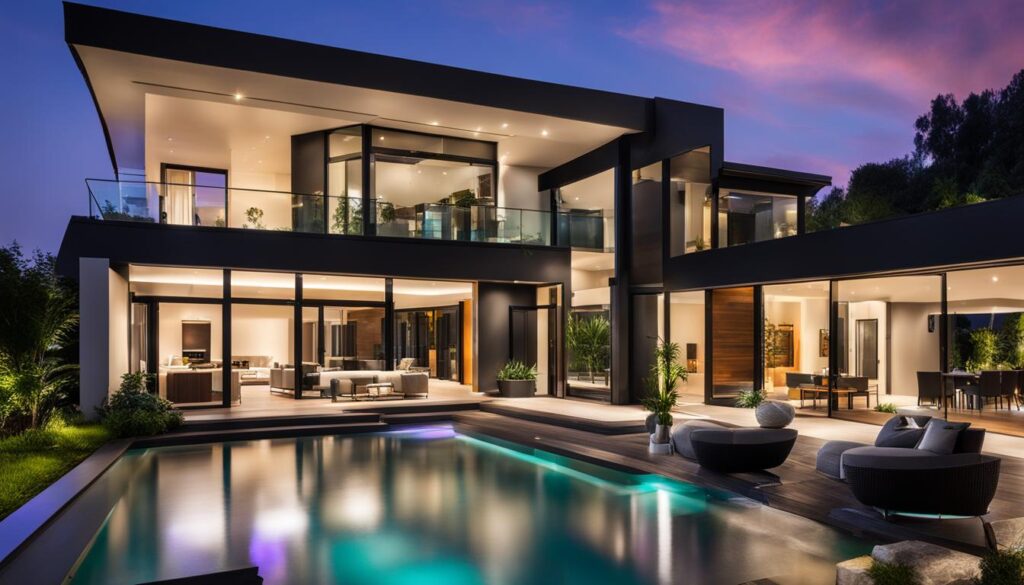
The Future of the Home Automation Market
The home automation market is on a steady growth trajectory, driven by advancements in technology and the increasing interest of consumers. As we look to the future, several trends and emerging technologies are shaping the landscape of home automation.
One of the key drivers of the future of home automation is the integration of emerging technologies such as artificial intelligence (AI), voice command systems, and IoT (Internet of Things) integration. These technologies are revolutionizing the way we interact with and control our smart homes, making them more intuitive and convenient.
In addition, the future of home automation will see a greater focus on personalization and customization. Home automation systems will be tailored to meet the unique needs and preferences of individual customers, offering a more personalized and tailored experience.
Energy efficiency and sustainability will also play a crucial role in the future of home automation. As consumers become more conscious of their carbon footprint, there will be a greater demand for smart home automation technology that helps optimize energy usage and promotes sustainable living.
Security and privacy will continue to be paramount in the future of home automation. Improved encryption and authentication measures will be implemented to address these concerns and ensure that smart homes remain secure and protected.
Furthermore, the adoption of smart home automation will extend beyond residential properties. The commercial sector, including offices, retail spaces, and hospitality venues, will also embrace smart automation to enhance efficiency and provide a seamless customer experience.
In conclusion, the future of the home automation market looks promising, with emerging technologies and trends driving innovation and growth. Entrepreneurs and businesses in this industry can seize the opportunities presented by the future of home automation to create innovative solutions that cater to the evolving needs of consumers.
FAQ
Is there money in the home automation industry?
Yes, starting a home automation business can be a lucrative opportunity with high profit potential and various revenue streams.
What are the benefits of starting a home automation business?
Starting a home automation business offers advantages such as low startup costs, high customer retention rates, and the ability to control your workload and gain exposure and experience.
What is the cost of home automation?
The cost of home automation can vary depending on the extent of installation and the chosen brands or companies. On average, homeowners spend around $5,500 for basic automation.
What are some popular smart home automations?
Popular smart home functions include automating lights, door locks, thermostats, smart speakers, hubs, video cameras, doorbells, smoke detectors, and smart lighting options.
Should I do DIY or hire a professional for home automation installation?
The decision depends on the complexity of the items and your time availability. Simple installations can be done by homeowners, while complex automation may require professional help for successful integration.
How can I maximize profits in the home automation industry?
To maximize profits, focus on customer satisfaction and retention, stay updated on industry trends, offer personalized solutions, provide exceptional customer service, and leverage digital marketing and strategic collaborations.
What is the future of the home automation market?
The future of home automation looks promising, with advancements in technology driving demand. Emerging trends include AI, voice command systems, IoT integration, energy efficiency, sustainability, and increasing adoption in commercial buildings.
